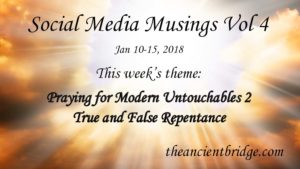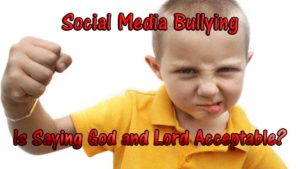Social Media Musings Vol 4: Praying for Modern Untouchables Part 2
 Continuing on from last week
Continuing on from last week
Day 9 – January 10, 2018
What Kind of Repentance am I Praying for?
I guess this requires a teaching about what repentance is and is not.
Repentance isn’t merely feeling bad and deciding not to do something ever again. True repentance has to be restorative in nature.
In the specific case of what I have been praying for, when I ask that a child molester be brought to repentance and salvation (so that they would stop offending), I am actually praying for that man or woman to not spend their time in a perpetual pity-party guilt trip, or to just wipe their slate clean and walk away happy. Forgiveness and repentance don’t work that way. Yes, there must be remorse – how could there not be considering the horrific and lifelong impact of this specific crime on their small victims? However, there also must be an accompanying yearning for justice. In order to love one’s neighbor, one has to be prepared to see restitution for that neighbor when they have been harmed, and not only that, to come to understand that their victims deserve some form of justice. There needs to be an acknowledgment of the damage, and the need for consequences.
If a murderer came to salvation and had gone unpunished, it would be wrong of them to keep hiding from the law, leaving the loved ones of their victim without the peace of closure and justice.
No, my prayers include justice – which will probably include jail time – if their victims decide to press charges (which is their absolute right). Salvation frees us of eternal condemnation, but not of our temporal consequences or our obligation to do what is right. Molestation hangs over the life of the victim, usually permanently in one form or another, and so the perpetrator cannot develop the attitude that they can just walk away. So they get saved, great! But a salvation that sees no problem in turning aside justice for the oppressed is a sham and self-serving.
Victims tend to live in the fear and dread that their molesters are out there harming other children, and it is very difficult to emerge from that little child mentality that marked the moment of their attack when certain portions of their psyche were stunted. In order to heal and grow, people often need vindication – even though true vindication cannot be had in this world because nothing can return them to who they would have been if the violation had never happened in the first place.
Also, former molesters have to realize that they knowingly committed a crime that would make them a pariah in this world, and so their ongoing lives are going to have to reflect the humility of the Cross. That is their cross to bear. They have to make peace with it – as I have said before, no one on this earth is entitled to restoration on their own terms, but we as Christians are obligated to forgive.Forgiveness and restoration are entirely different animals.
.
Day 11
When God Saves
The famous John 3:16 just exploded in my head last night. For God so loved the world…
It became clear to me that when God saved me from my sins, He saved the world at the same time – from my sins. My salvation wasn’t just about me, about me getting a personal relationship with God, about me having eternal life, about me, me, me. My salvation was about transforming me into the type of person who no longer thought it was okay to be critical, cruel, hostile, insulting, impatient, and prone to fits of anger anymore. That saved the world from who I was, so the world would no longer be under the constant onslaught of my unsaved self. Not that the world doesn’t suffer sometimes still, as I a not perfect by any stretch of the imagination, but my sin footprint is much smaller.
Hence, the commandment to pray for our enemies and those who persecute us, so that God can save them, and us, from their sins as well. That should pretty much motivate us to pray for anyone and everyone. Unless, of course, we like the consequences of their sins.
Shabbat Shalom all.
January 13, 2018
I think of the Sabbath as a sort of hospice for the weak and weary, those who are in need of God’s rest, a taste of the world to come (which is, you know, everyone), and as such we can behave in one of a few ways:
(1) we can choose to act the way we act every day, just without working.
(2) we can act like mental ward patients, stirring up dissension over our agendas, and actually impede the healing of others through treating them badly in the Name of God (or whatever our version of it is).
(3) We can cooperate with, and assist our creator in this process through acts of radical kindness, peacefulness, and gentleness.
Which do we think will be counted as Sabbath-keeping?
Day 13
Finding the balance between hope for redemption and the need for justice
On Friday I had become certain that I had allowed the Andy Savage incident to steer me off course and distract me. However, I was missing an important piece of the puzzle. Before praying for the repentance and salvation of sexual predators (so they will stop claiming new victims), I was a little ball of pure hatred with fantasies of vengeance. I wanted them to all die in their sins, and never considered the very real victim toll that would result because of that – not a toll in terms of predators being victims, but new children being victimized. Of course, God showed me that price tag was not acceptable to Him and now it is no longer acceptable to me either – I would see them all saved and redeemed before I would consent to the violation of even one more child. I imagine that if you could look at the child, and if you had the power of that choice, you would come to the same conclusion – we cannot sacrifice even one on the altar of wanting retaliation at any price – not if there is another possibility in some cases. So I pray. It is for God and the offenders to determine who will come to life and who will die in their sins.
And so I have been praying, and somewhat softening. I was concerned that I would soften too much, and lose my sense of outrage and my desire for justice (salvation does not erase the effects of sin on the victim nor the earthly consequences earned by the offender). Fortunately, this violation of a 17-year-old youth group student by her youth group minister, 20 years ago, and his narcissistic response to the situation – well, it allayed my fears. If anything, I am far more concerned with actual justice than I ever was. Before this, my mind was set on revenge and not justice, I was angry and was displaying bad, yet understandable, fruit. Justice requires wisdom, discernment, and peace, while I was blinded by fantasies of revenge. Woe to the person falsely accused if they were placed under my care…
But I lacked balance. I didn’t want it. I wanted it easy. Nothing is easy. If we do not pray for our enemies, they will keep sinning against people. Bottom line. The only cure for sin is Yeshua/Jesus and the Cross. The salvation of our enemies is the price we must all be willing to pay in order to put an end to their sinning against ourselves and others – and that goes for any type of sin.
The world is taking care of the revenge bit – the guy lost his publishing contract, and the respect – maybe not of his church, but of the world. I would be shocked if there were not picketers outside of his mega-church this morning. Most Christians worldwide are standing on the side of his victim. Sadly, what he did in Texas was immoral and unbefitting anyone in a pastoral position, but not illegal, although in 17 other states it is illegal for any clergy to have intimate relations, consensual or forced, with any parishioner under their care. I am praying that all 50 states will soon have that law on the books. Perhaps they could call it Jules’ Law. I encourage you strongly to contact your state legislature and apply pressure to get such a law on the books. I will definitely be adding this to my prayers, and actually, I would love to see this become a national law. It is horrifying to think that the Body needs secular guardrails in order to prevent activities that are already outlined as sinful in the world – but it is what it is.
Tomorrow I want to talk about how sin compromises the lives of everyone, on both sides of the equation – and sometimes most especially those close to the sinner.
Day 14
How Sin Compromises Everyone
You’ve heard the platitude/slogan – “Love the sinner/hate the sin” and you all know how I feel about platitudes – if a platitude or slogan is all you have to offer, then best say nothing at all.
I hate this one, not because it isn’t true, because it is, but because we don’t know how to do it – so saying it is practically meaningless. Overwhelmingly, our tendency is to be partial, and not impartial, in justice: we can’t hand the same sentence out to our sons, daughters, mother, father, spouse, friend, etc. as we could to a stranger. This happens because the sins of strangers can be met with a certain level of cold objectivity, whereas our love for certain people tends to lessen the severity of their crimes in our minds. When it comes to family members or, as we have seen lately in the case of Highpoint Church in Memphis, OUR pastor, we are biased, and often to the point of blindness. Instead of loving the sinner and hating the sinner, we adopt a different mantra of unequal weights:
Love the sinner, enable the sin.
Love the sinner, ignore the sin.
Love the sinner, say the sin isn’t really so bad.
Love the sinner, cover up their sin.
Love the sinner, blame the victim.
Love the sinner, wait – is he really even a sinner here?
Whereas those who love the victim have a less complicated mantra:
Hate the sin, hate the sinner.
See Tom. See Tom Sin. Tom needs to burn in hell. Does anyone have a match?
You see what happens? Tom sinned against an undeserving victim, and then the effect of his sin made transgressors out of many. Tom’s sin compromised everyone.
Ever wonder why certain sins in the Bible carried the death penalty? Because they were the kinds of sins that set loose this terrible kind of transgression within the community – they destroyed the unity of God’s people. We can hardly help ourselves but to fall onto one or the other side of any crime where we know the participants. Sin poisons everyone. We want, in our flesh, to condemn or to excuse that which touches us, and not in a reasonable way, but in as extreme a way as the feelings the crime engenders.
This is why crime is so horrible – it taints the lives of everyone. There is never just one victim. Everyone is a victim – the only question is, to what extent?


